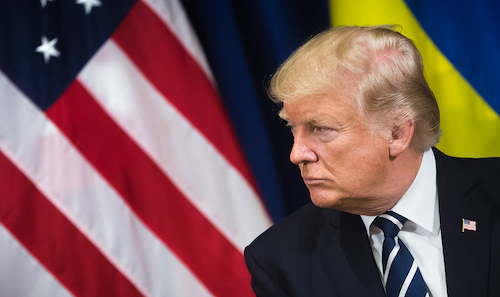 It’s a phenomenon referred to by some psychologists as Trump Anxiety Disorder.
It’s a phenomenon referred to by some psychologists as Trump Anxiety Disorder.
Political division is one of the most divisive topics in the United States with 86 per cent of people seeing strong conflicts between Democrats and Republicans.
Across the country, people are experiencing stress and lack of sleep due to their worries about politics in the Trump era. A recent study found one in seven Americans, about 34 million people, are struggling to sleep they are so stressed about politics.
But it’s not just sleeping habits that are being impacted by politics in the Trump Era. Political division is making its way to the workplace, and the consequences are significant.
Professor Wayne Hochwarter is a professor of Organization Behaviour at Florida State University and a Professorial Fellow at the Center for Sustainable Human Resource Management at Australia Catholic University. He wanted to see how significantly political division is impacting workplaces across the country.
He asked 550 full time employees to respond to statements on a variety of workplace issues, including workplace relationships to health and the impact of unwelcome political discussions.
27 per cent of those who took part in the study agreed or strongly agreed that the workplace is now more tense due to political discussion. One third of the participants noted that talking about politics is distracting. One in four of those surveyed said they went as far as to actively avoid certain people they worked with, who were likely to try and influence their views. One in five had lost friendships at work due to partisanship.
“Over the first cup of coffee, it is common to start a conversation with “did you see what Trump had to say last night? Or the Democrats?’ People, by default, want to be part of something larger than themselves. Unfortunately, the divisiveness has given them an opportunity to perpetuate the separations that we are currently experiencing,” Professor Hochwater told Theravive.
The average person spends around 25 per cent of their adult life at work. As workplaces become more tense, the impact on mental and physical health can be considerable. According to the American Psychology Association, stress at work can lead to burnout, emotional exhaustion and the development of cynical and negative attitudes. Burnout can also result in depression, which can lead to a number of other health conditions like obesity, diabetes and strokes.
Hochwater’s study found that more than a quarter of those surveyed said political division has resulted in increased stress levels in the workplace and interferes in their productivity in completing tasks. Of those who were experiencing increased levels of stress, nearly a third said they would call in sick on days when they didn’t feel like being in the workplace. Of those who don’t feel stressed due to politics, only 17 per cent said they would call in sick.
“Trump is part of the zero-sum phenomenon. You can’t really ‘kind of like him’ or ‘kind of not like him’. Because there are a few opportunities for compromise, it makes the situation very stressful. In the past, people would leave their political ideologies either at home or in their car before work. Now people are not afraid to voice their opinions. We used to tell our children not to ask other people about their income, their sex lives, or their political leanings. Obviously, we have not stayed true to one out of three of them,” Hochwater said.
It’s not just Hochwater’s study that suggests Americans are more stressed about politics than ever before. The American Psychological Association’s Report “Stress in America” found that 59 per cent of Americans consider this to be the lowest point in United States history in living memory. This includes World War II, the Vietnam War, the September 11 terror attacks and the Cuban Missile Crisis. 63 per cent or almost two thirds of Americans identified the future of America as a significant source of their stress, outranking even stressors like money and work.
When asked in 2017 to think about the state of the nation, six out of 10 adults, or 59 per cent, said the social divisiveness currently being experienced across the country is causing them stress.
That stress transcends party lines, though Democrats are more likely to experience stress due to politics. 73 per cent said politics was social divisiveness caused them stress compared with 65 per cent of Republicans and 59 per cent of independents.
“People are being pulled in a number of direction already dealing with work, families, the economy, aging parents, picking up dry cleaning, health care. This is just one more cause of people having focus messed with,” Hochwater said.
He says there is not much companies can do about political division in the workplace.
“I think it would be incredibly challenging to prohibit talk of this nature. How do you do it? What are the penalties? Does this violate free speech mandates?
At some point, one side is going to feel violated,” he said.
He argues managers should be proactive and focus on effective leadership to ensure a minimum amount of stress for employees.
“The best approach is to allow people open opportunities for civil discussion and also let people get professional help and guidance if the environment becomes too toxic as a result.”
Elizabeth Pratt is a medical journalist and producer. Her work has appeared on Healthline, The Huffington Post, Fox News, The Australian Broadcasting Corporation, The Sydney Morning Herald, News.com.au, Escape, The Cusp and Skyscanner. You can read more of her articles here. Or learn more about Elizabeth and contact her via her LinkedIn and Twitter profiles.